上海牛津版英语六年级下册6BUnit4U4同步讲义
沪教牛津版六年级英语下(Unit4 基础知识梳理)
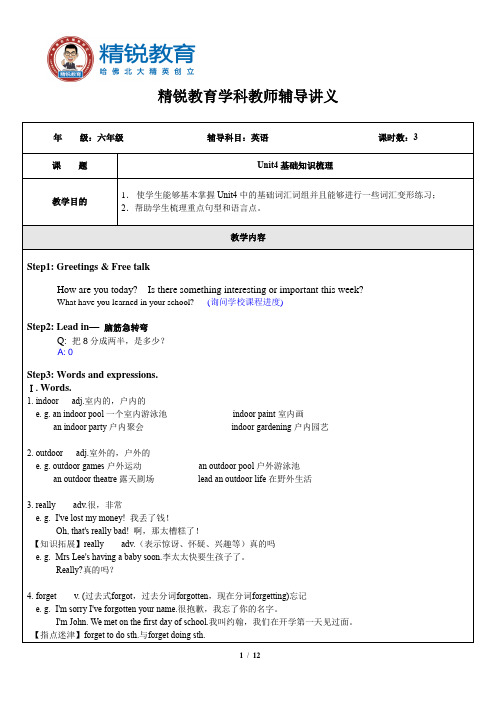
精锐教育学科教师辅导讲义前者表示‘‘忘记去做某事”,而后者表示“忘记做过某事”的意思。
e. g. She forgot to post the letter.她忘记寄这封信了。
I'll never forget meeting my school headmaster for the first time.我永远忘不了和我校长初次见面的情景。
5. puzzle n.难题;智力游戏;拼图【记忆链接】crossword puzzle填字游戏jigsaw puzzle拼图玩具e. g. How dinosaurs died out is still a puzzle. 恐龙是如何灭绝的仍然是一个谜。
Their reason for doing it is still a puzzle to me. 他们为什么要做此事我仍莫名其妙。
6. playground n.操场e. g. There is a big playground in the front of our building. 在我们的教学楼前有一个大操场。
7. piano n.(复数pianos)钢琴e. g. -Mary began to play the piano when she was four. 玛丽从4岁开始弹钢琴。
-Then she must be a good player. 那她一定弹得很好。
【百科小贴士】钢琴是一种键盘乐器,1709年左右由克里斯托福里在佛罗伦萨制造出来,18世纪中叶广泛流行。
钢琴有各种式样和各种不同尺寸;现代钢琴的音质和触键都与以前的钢琴有很大不同。
8. model n. 模型e. g. -What are you doing? 你在做什么?-I'm building a model plane.我在做一架模型飞机。
【记忆链接】model ship 船模9. health n.健康e. g.-Which would you choose, health or wealth? 健康和财富,你选择哪一个?-Health, if I have to choose one.如果非得选一个的话,我选健康。
牛津小学英语6Bunit4课件NX
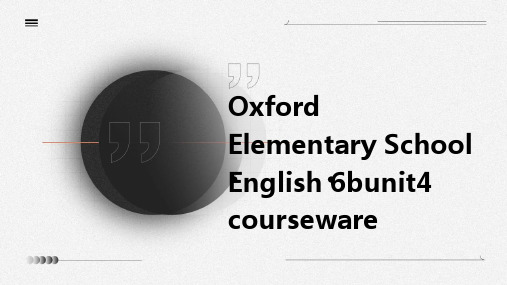
引导学生辨析相似语法点之间的差异, 以避免混淆和错误使用。
语法运用
通过例句和练习,让学生在实际语境 中运用语法规则。
03
teaching method
Situational teaching method
定义
特点
情境教学法是一种通过模拟真实情境来教 授知识的方法。
情境教学法注重创造与现实生活相似的情 境,使学生能够更好地理解和应用所学的 知识。
教学反思
对教学过程进行深入反思,找出 教学中的不足和问题。
改进方案
根据教学反思的结果,制定针对 性的改进措施,提高教学质量。
持续学习
不断学习新的教学理念和方法, 提升自身的教学水平和专业素养。
感谢观看
THANKS
培养自主学习和合作学习能力, 能够独立完成学习任务并参与小
组讨论。
培养批判性思维和解决问题的能 力,能够分析问题并提出解决方
案。
Emotional goals
培养学生对英语学习的兴趣和 热情,激发学习动力。
培养学生的自信心和自尊心, 鼓励他们勇于尝试和表达自己 的观点。
培养学生的团队合作精神和社 交能力,促进班级内部的交流 与合作。
Teacher self-evaluation
教学内容评估
反思教学内容是否符合教学目标, 是否满足学生的学习需求。
教学方法评估
评估所采用的教学方法是否有效, 是否有助于学生理解和掌握知识。
课堂管理评估
评估课堂管理方式是否得当,是否 能有效调动学生的学习积极性。
Teaching Reflection and Improvement
优势
任务型教学法能够培养学生的自主学习和合作学习能力,提高他们的 实际操作能力。
上海沪教牛津版英语六年级下册Unit 4 Art 课件
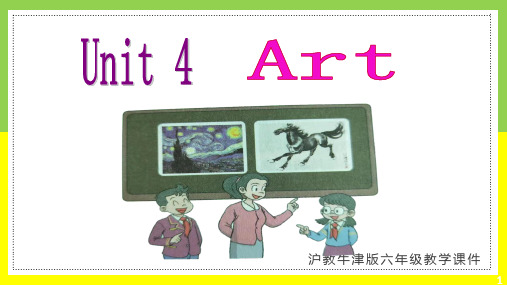
about在这里意为“关于”,它有许多含义,我们一起来看一下吧。
news about animals 关于动物的新闻
at about 12 o'clock 大约在12点钟
run about the park 在公园各处跑
……………………………………………………………………………………………………………………………………………………………………
王老师: 这是一幅油画。它色彩丰富。
Joe:
I like the one on the right. I like horses. This horse
looks powerful.
乔:
我喜欢右边的那幅。我喜欢马。这匹马看起来很有力量。
Miss Wang: This is a Chinese ink painting. It's usually in black and
……………………………………………………………………………………………………………………………………………………………………
课文开心 易 学
brush
画笔;刷子;刷
paints
绘画颜料
on the left
在左边
on the right
在右边
……………………………………………………………………………………………………………………………………………………………………
……………………………………………………………………………………………………………………………………………………………………
12
……………………………………………………………………………………… ………………………………………………………………………………………
Unit 4 第2课时 课文讲解及句型拓展-学年六年级英语下册同步精品课堂(牛津上海版)

C
Daily expressions. 日常表达
1. like/love/enjoy doing… 喜欢做…
e. g. Many children like/love/enjoy flying kites on a fine day.许多孩子喜欢在晴天放风筝。
2. have a headache 头痛“身体部位+ache”表示病痛。此处have 意为“患病,得病”。
e. g. have a stomach ache胃痛
have toothache牙痛【知识
拓展】其他对于身体不适的表达还有:
have a cold感冒
have a fever发烧
3. practise swimming练习游泳 practise doing sth.表示“练习做……”“训练……”的意思。
Choose the word or expression which is closest in meaning to the underlined part in each sentence. A. would like to B. sad C. without D. send E. take hie likes singing.
【记忆链接】 like/ love/ enjoy doing sth.喜欢做某事 He enjoys reading books when he is free. 当他空闲的时候 他喜欢读书。
【拓展】 enjoy oneself = have a good time = have fun 过得愉快 I hope you enjoy yourselves.我希望你们玩得开心。
2-2
No. of students
12
沪教牛津版六年级下册英语Unit4第1课时教学课件

课堂导入
同学们明天就要去艺术馆了,王老 师给他们讲了很多有名的画作。一 起来看看吧!
第九页,共二十四页。
Listen and say
The students are going to an art museum tomorrow.Miss Wang is telling them about some paintings.
第十五页,共二十四页。
单元新词
brush 画笔;刷子;刷
例 Students will not carry any brushes. 同学们将不用携带任何铅笔。
第十六页,共二十四页。
单元新词
paints 绘画颜料
例句: .He is our new head teacher.
他是我们的新校长。
第十七页,共二十四页。
2. Which one do you like?
重点短语:art museum 艺术博物馆 on the left
在左边
第二页,共二十四页。
课堂导入
第页,共二十四页。
课堂导入
第五页,共二十四页。
课堂导入
第六页,共二十四页。
课堂导入
第七页,共二十四页。
课堂导入
第十页,共二十四页。
Listen and say
Miss Wang: Look at the two pictures on the blackboard.Which one do you like?
kitty:I Like the one on the left.I like the colours.The night sky is beautiful.
Miss Wang:This is an oil painting.It's colourful. Joe: i like the one on the left.I like horses.This horse looks
牛津译林版六年级下册英语(6B)Unit 4 Road safety-Story time课件
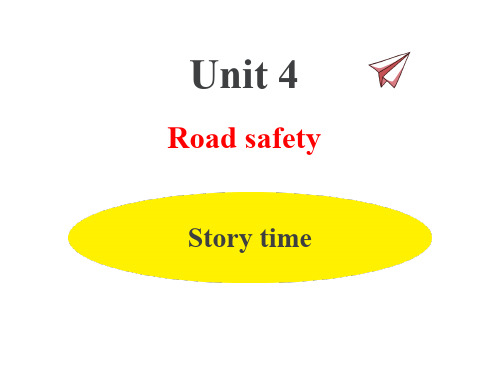
You mustn’t drive so fast.
Make a video of road safety.
You must… You mustn’t…
You mustn’t climb over the rail.
Make a video of road safety.
You must… You mustn’t…
Make a video of road safety
Make a video of road safety.
You must… You mustn’t…
You must look for a zebra crossing.
Make a video of road safety.
You must… You mustn’t…
You must first look left , then right and then left again. You can cross the road with other people .
What mustn’t you do on the road?
What mustn’t you do on the road?
You mustn’t ride on the road.
You must… You mustn’t…
Our video is ready! 我们的视频制作成功!
Cherish life Civilization trip
关爱生命 文明出行
YYYYooouoYYuuumYoommomuuusuuuutmmYslsmosotuutuotlnsunoskmt’ost’atutnfkttosdnc’tftlhtronl’loetiir’rmvtwutratreianabdzktfshfeeeoiocobetnvoorliafsoegnatihrchmgsttrentsahtoh..nsserey.sorpiranoeagdoai.p.ld.le. .
上海牛津版英语六年级下册6BUnit4U4同步讲义

学员编号:年级:课时数:学员姓名:辅导科目:英语学科教师:授课类型T Unit4(牛津6下)基础知识梳理教学目标1、使学生能够基本掌握牛津6年级下册Unit4中的基础词汇及重要句型;星级★★★授课日期及时段T同步-U4基础知识梳理(建议2-5分钟)批注:上面图片涉及到孩子们平时的室外活动,和学生讨论平时喜欢什么类型的室内外活动,并讨论活动的意义,导出主题stay healthy。
(建议20-25分钟)想知道更多的室内外活动及其意义吗?让我们先扫开单词障碍吧!一、词汇Words1. indoor adj.室内的,户内的e. g. an indoor pool一个室内游泳池indoor paint室内画an indoor party户内聚会indoor gardening户内园艺2. outdoor adj.室外的,户外的e. g. outdoor games户外运动an outdoor pool户外游泳池an outdoor theatre露天剧场lead an outdoor life在野外生活批注:这里可以引入常见的室内外活动的英文表达,可以为孩子写作文积累素材。
丢沙包:earth bags; 踢毽子:Shuttlecock;跳绳:rope skipping;打篮球:play basketball;踢足球:play football;打排球:play volleyball;游泳:;画画:drawing;弹钢琴:play the piano;郊游:go for an outing;露营:go camping。
4. forget v. (过去式forgot,过去分词forgotten,现在分词forgetting)忘记e. g. -I'm sorry I've forgotten your name.很抱歉,我忘了你的名字。
-I'm John. We met on the first day of school.我叫约翰,我们在开学第一天见过面。
牛津小学六年级下册6B英语教案Unit4
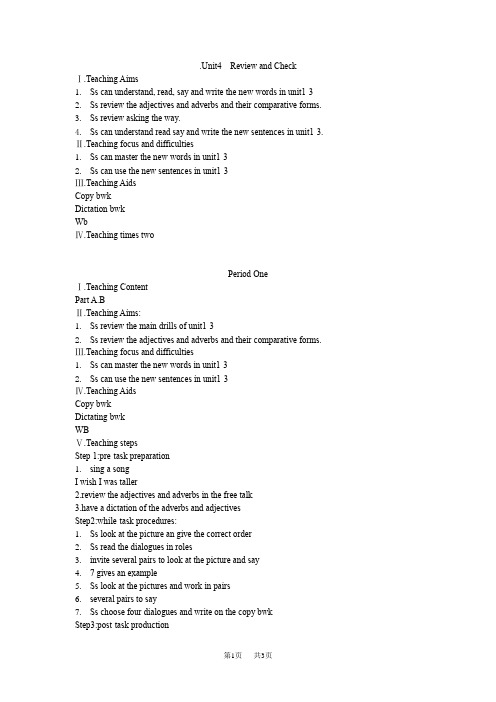
.Unit4 Review and CheckⅠ.Teaching Aims1.Ss can understand, read, say and write the new words in unit1-32.Ss review the adjectives and adverbs and their comparative forms.3.Ss review asking the way.4.Ss can understand read say and write the new sentences in unit1-3.Ⅱ.Teaching focus and difficulties1.Ss can master the new words in unit1-32.Ss can use the new sentences in unit1-3Ⅲ.Teaching AidsCopy bwkDictation bwkWbⅣ.Teaching times twoPeriod OneⅠ.Teaching ContentPart A.BⅡ.Teaching Aims:1.Ss review the main drills of unit1-32.Ss review the adjectives and adverbs and their comparative forms.Ⅲ.Teaching focus and difficulties1.Ss can master the new words in unit1-32.Ss can use the new sentences in unit1-3Ⅳ.Teaching AidsCopy bwkDictating bwkWBⅤ.Teaching stepsStep 1:pre-task preparation1.sing a songI wish I was taller2.review the adjectives and adverbs in the free talk3.have a dictation of the adverbs and adjectivesStep2:while-task procedures:1.Ss look at the picture an give the correct order2.Ss read the dialogues in roles3.invite several pairs to look at the picture and say4.7 gives an example5.Ss look at the pictures and work in pairs6.several pairs to say7.Ss choose four dialogues and write on the copy bwkStep3:post-task production1.Ss review the wordsI my mine you your yoursHe his him she her hers they their theirs2.Ask and answer with the drillsWho is……than…..?Whose ……is……,yours or mine?3.Ss do some exercise to consolidateStep4: homework1.dictation2.recite part A.BStep5: writingUnit 4 Review and Check As……as /thanHow far……?Period twoⅠ.teaching contentPart C.DⅡ.teaching aims1.Ss review the adjectives and adverbs and comparative forms2.Ss review asking and answer the wayⅢ.teaching focus and difficulties1.Ss master the way to ask and answer the way2.Ss master the use of the verb phrases with adverbsⅣ.teaching aidsDictation bookWBⅤ.teaching steps:Step1:pre-task preparation1.ask and answerwho is…than…?Whose…is…,yours or mine?2. ask and answerWho jumps farther, you or she?Does …jump higher than…?2.have a dictation of the wordsStep2:while-task procedures1.Ss look at the pictures, read an fill in blanks2.Check and correct3.7 asks Ss the way to…(a real place near the school)Ss work in groups, try to tell the way.4.Ss ask and answer the way (real place)Step3:post-task production1.learn the reportsa.Ss read the reports themselvesb.7 asks some questions, Ss answerc.Ss learn the asking and answering in the bwkd.Ss ask and answer according to the reportsplete the lettera.Ss complete the letter according the reportsb.7 checks then Ss read itStep4 homework1.Ss read and say part D x k b1.co m2.Ss recite part A.BStep5 writingUnit 4 review and check The way to……Turn right/left at……Get off at……Go along……。
六年级英语下册 6B unit4(1)课件 苏教牛津版
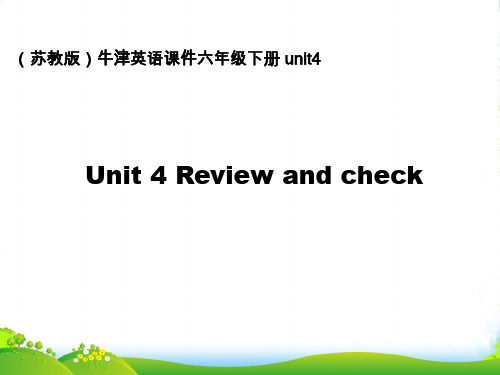
A: How far is the station from here?
B: It’s about 3 kilometers away. A: How can I get there? B: You can take bus No. 6.
•1、书籍是朋友,虽然没有热情,但是非常忠实。2022年3月2日星期三2022/3/22022/3/22022/3/2 •2、科学的灵感,决不是坐等可以等来的。如果说,科学上的发现有什么偶然的机遇的话,那么这种‘偶然的机遇’只能给那些学有素养的人,给那些善于独 立思考的人,给那些具有锲而不舍的人。2022年3月2022/3/22022/3/22022/3/23/2/2022 •3、书籍—通过心灵观察世界的窗口.住宅里没有书,犹如房间里没有窗户。2022/3/22022/3/2March 2, 2022 •4、享受阅读快乐,提高生活质量。2022/3/22022/3/22022ay!
我们,还在路上……
情景说话
当你想问对方的妈妈是否和爸爸一 样高时,可以说什么? Is your mother as tall as your father?
情景说话
当你想问Jim是否游泳比David慢时, 可以说什么?
Does Jim swim slower than David?
情景说话
当你想问男孩们是否跳得比女孩们高 时,可以说什么?
(苏教版)牛津英语课件六年级下册 unit4
Unit 4 Review and check
情景说话
当你想问谁比David高,可以说什么? Who’s taller than David?
情景说话
当你想和你的同桌比一比谁的书包更 重时,可以说什么? Whose school bag is heavier, yours or mine?
上海牛津沪教版六年级(下)同步讲义unit4
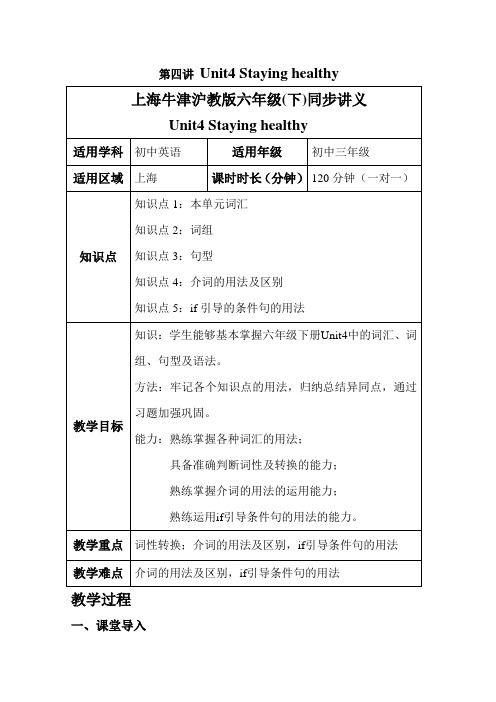
第四讲Unit4 Staying healthy教学过程一、课堂导入教师讲述一个与本节课题目有关的英文小故事,引出今日所要讲解的知识点,然后让学生简单梳理一下所涉及的问题,带着问题学习本节课的内容。
二、复习预习教师引导学生复习上节课学的重点内容,检测单词的用法,(以提问、回顾的形式进行),针对上节课的作业进行讲评、订正、答疑,并通过英文小故事导入本节课所要学习的新知识。
三、知识讲解1. 知识点一:重点单词1)indoor ['ɪndɔː]【词性】adj.【词义】室内的,户内的【易混淆点】inside adj. 内部的,里面的【经典例句】There is a big indoor swimming pool in this hotel.这家旅馆内有一个大的室内游泳馆。
2)outdoor ['aʊtdɔː]【词性】adj.【词义】室外的,户外的【易混淆点】outside adj.外部的,在外面的【经典例句】They needed the outside help.他们需要来自外界的帮助。
3)really ['riːəli]【词性】adv.【词义】真正地,的确【易混淆点】surely adv.真正地【经典例句】I really care about the students in my class.我的确喜欢这个班里的学生。
4)forget [fə'get]【词性】v.【词义】忘记【易混淆点】remember n.记的【经典例句】You'd better forget for the moment.你最好暂时忘掉吧。
5)playground [ 'pleigraʊnd ]【词性】n.【词义】操场【易混淆点】field n.场地【经典例句】The city has several playgrounds for children.这座城市有好几个儿童游乐场。
《牛津小学英语》6B UNIT4 教案与课件
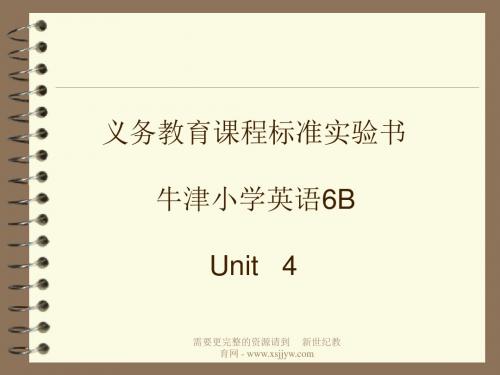
需要更完整的资源请到 新世纪教 育网 -
需要更完整的资源请到归纳 新世纪教 育网 -
需要更完整的资源请到 新世纪教 育网 -
需要更完整的资源请到 新世纪教 育网 -
( ) 2. work morning ( ( ) 4. sports forty ( ( ) 6. you blouse ( ( ) 8. teacher her ( ( ) 10. yellow now (
) ) ) ) )
需要更完整的资源请到 新世纪教 育网 -
需要更完整的资源请到 新世纪教 育网 -
原级 级
比较级
Hale Waihona Puke 原级young long strong small thin high fast early well
比较
old older tall taller short shorter big bigger fat fatter heavy heavier slow slower low lower late later far farther
younger longer stronger smaller thinner higher faster earlier better
需要更完整的资源请到 新世纪教 育网 -
选择适当的词填空
1.long longer My ruler is as ______as your ruler. Whose hair is ______, his or hers? 2.high higher Tom can jump very _______. He jumps ________ than his brother. 3.early earlier Is he late today? No, he’s very _______. But Tom is _______than him. 4.strong stronger Jack is a ________boy. He is as _____as his father. Nobody is ________than him in his class. 5.well better Can Nancy dance _______? No. Many students can dance ______than her. 6.low lower Look at the two kites, Which one is flying ______, the blue oneor the red one? 7.fast faster Who swims_____ than Jim? Gao shan does. Gao shan swims as ______as Liu Tao.
牛津版小学六年级英语下册6B全册教案.docx
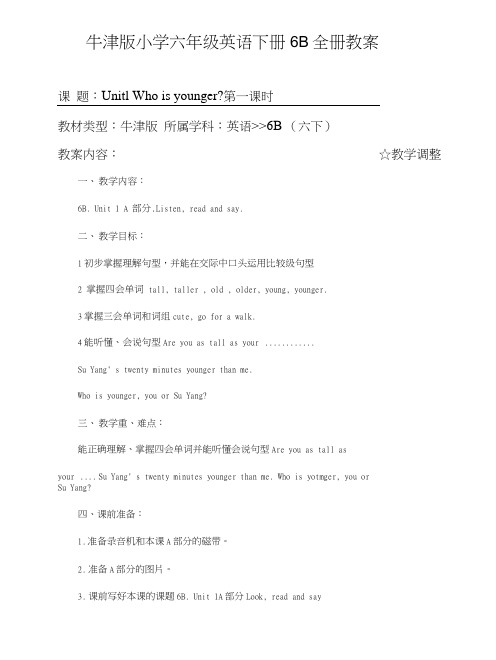
牛津版小学六年级英语下册6B全册教案课题:Unitl Who is younger?第一课时教材类型:牛津版所属学科:英语>>6B (六下)教案内容:☆教学调整一、教学内容:6B. Unit 1 A 部分.Listen, read and say.二、教学目标:1初步掌握理解句型,并能在交际中口头运用比较级句型2 掌握四会单词tall, taller , old , older, young, younger.3掌握三会单词和词组cute, go for a walk.4能听懂、会说句型Are you as tall as your ............Su Yang' s twenty minutes younger than me.Who is younger, you or Su Yang?三、教学重、难点:能正确理解、掌握四会单词并能听懂会说句型Are you as tall asyour .... Su Yang' s twenty minutes younger than me. Who is yotmger, you orSu Yang?四、课前准备:1.准备录咅机和本课A部分的磁带。
2.准备A部分的图片。
3.课前写好本课的课题6B. Unit 1A部分Look, read and say五、教学过程:1•听本课A 部分的录音,耍求学生跟读、读熟,并能够和同学比身高和年龄。
herTs your father40 years old?2•翻译下列短语。
1•去散步 6.在一棵大树下2.双胞胎姐妹 7.多机灵的一只小狗!3.看起来一样 &你有一个弟弟4.和…一样高 9.唯一的子女5.比…大一岁 10.你家的3.选择填空1.Are you as your as () )5. -What do your parents do after supper?——They take our dog a walk.A. goB. of C ・ forclassmeite, Xiao Hing?A. tallB. taller C ・ youngerA. )2. In, walk Saturday morning, they went for aB. On, walkC. At, walking)3.This dog is than that one.A. thinB. thinner C thinnerA. )4. yours Whose ruler is longer,or his B. your or his C. yours orfat, fatter, thin thinner, small, smaller教学反思:课题:Unitl who is younger?第四课时四、课前准备运用本单元的句型学生互相问答教学反思:2并能熟练运用四会句型:Ben runs faster than Jim . Do theboys jump higher than the girls? Yes , they do. Does Jim swim s 1 ower than David? No, he docsn, t.四、课前准备:1准备录咅机和本课C部分的投影片。
牛津上海版六年级下Unit4-Unit6重点知识点复习教案
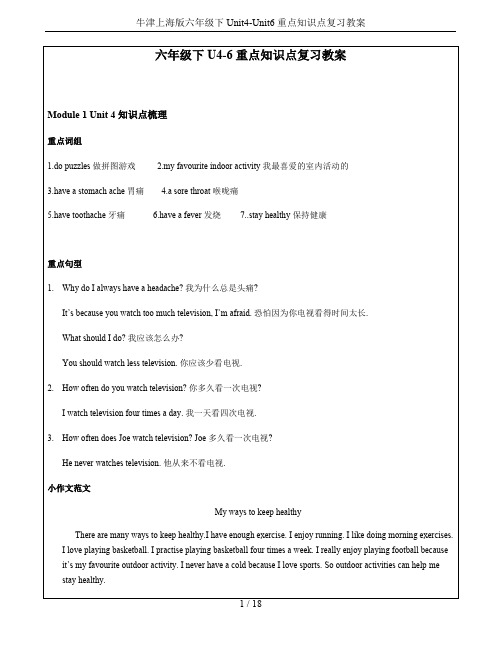
4 / 18
牛津上海版六年级下 Unit4-Unit6 重点知识点复习教案
Module 1 Unit 5 复习练习 Ⅰ. 默写. 1. 长得好看_________________2. 长得苗条______________3. 擅长__________________ 4. 戴眼镜___________________5. 灭火_____________6. 在面包房_____________________ 7.使病人恢复健康_____________________
1 / 18
牛津上海版六年级下 Unit4-Unit6 重点知识点复习教案
Module 1 Unit 4 复习练习
Ⅰ. 默写.
1.做拼图游戏___________________ 2.我最喜爱的室内活动的_____________________
3.胃痛_________________ 4.喉咙痛__________________
5 / 18
牛津上海版六年级下 Unit4-Unit6 重点知识点复习教案
A. has B. had C. is having D. will have ( ) 8. When Sally is 30 year’s old, she will be 165 centimeters _________
5.have toothache 牙痛
6.have a fever 发烧 7..stay healthy 保持健康
重点句型 1. Why do I always have a headache? 我为什么总是头痛?
It’s because you watch too much television, I’m afraid. 恐怕因为你电视看得时间太长. What should I do? 我应该怎么办? You should watch less television. 你应该少看电视. 2. How often do you watch television? 你多久看一次电视? I watch television four times a day. 我一天看四次电视. 3. How often does Joe watch television? Joe 多久看一次电视? He never watches television. 他从来不看电视. 小作文范文
六年级英语下册 6B Module1 Unit4(4)教案 沪教牛津版

3 Invite some students to read out their report to the class and show their illustration.
4 Bind the reports into a class book called ‘The night sky’.
1.Discribe the stars.
1. Read and recite the poem.
2 .Copy the new words.
3.Make a new poem.
说说做做练练中,让学生掌握关键句型。
e.g. What can you see?
Key Points: What can you see?
Watching us and winking.
Difficult Points: Watching us and winking.
Teaching Aids:tape、 radio 、word cards.
Procedures
Contents
Methods
Purpose
Warming
up
Pre-task preparation
1.Reading
2.Daily talk:
1.Revision:
2. New words
Ps
T—P
WhenHale Waihona Puke can we see the Sun?
- 1、下载文档前请自行甄别文档内容的完整性,平台不提供额外的编辑、内容补充、找答案等附加服务。
- 2、"仅部分预览"的文档,不可在线预览部分如存在完整性等问题,可反馈申请退款(可完整预览的文档不适用该条件!)。
- 3、如文档侵犯您的权益,请联系客服反馈,我们会尽快为您处理(人工客服工作时间:9:00-18:30)。
学员编号:年级:课时数:学员姓名:辅导科目:英语学科教师:授课类型T Unit4(牛津6下)基础知识梳理教学目标1、使学生能够基本掌握牛津6年级下册Unit4中的基础词汇及重要句型;星级★★★授课日期及时段T同步-U4基础知识梳理(建议2-5分钟)批注:上面图片涉及到孩子们平时的室外活动,和学生讨论平时喜欢什么类型的室内外活动,并讨论活动的意义,导出主题stay healthy。
(建议20-25分钟)想知道更多的室内外活动及其意义吗?让我们先扫开单词障碍吧!一、词汇Words1. indoor adj.室内的,户内的e. g. an indoor pool一个室内游泳池indoor paint室内画an indoor party户内聚会indoor gardening户内园艺2. outdoor adj.室外的,户外的e. g. outdoor games户外运动an outdoor pool户外游泳池an outdoor theatre露天剧场lead an outdoor life在野外生活批注:这里可以引入常见的室内外活动的英文表达,可以为孩子写作文积累素材。
丢沙包:earth bags; 踢毽子:Shuttlecock;跳绳:rope skipping;打篮球:play basketball;踢足球:play football;打排球:play volleyball;游泳:;画画:drawing;弹钢琴:play the piano;郊游:go for an outing;露营:go camping。
4. forget v. (过去式forgot,过去分词forgotten,现在分词forgetting)忘记e. g. -I'm sorry I've forgotten your name.很抱歉,我忘了你的名字。
-I'm John. We met on the first day of school.我叫约翰,我们在开学第一天见过面。
【指点迷津】forget to do sth.与forget doing sth.前者表示‘‘忘记去做某事”,而后者表示“忘记做过某事”的意思。
e. g. She forgot to post the letter.她忘记寄这封信了。
I'll never forget meeting my school headmaster for the first time.我永远忘不了和我校长初次见面的情景。
批注:这里可以将remember和forget一起讲解。
9. health n.健康e. g.-Which would you choose, health or wealth? 健康和财富,你选择哪一个?-Health, if I have to choose one.如果非得选一个的话,我选健康。
【知识拓展】healthy adj. (比较级healthier,最高级healthiest)健康的.e. g. -How can we keep healthy? 怎样才能保持健康?-Eat healthy food and do exercise.吃健康食品,做运动。
批注:健康食品的英文表达为health food,不健康食品为unhealthy food.11. headache n.头痛e. g. -Are you all right? You look pale.你身体不舒服吗?你脸色苍白。
-I have a bad headache.我头疼得厉害。
【知识拓展】病痛的表达(1)英语中身体各部位疼痛的词多数由“部位+ache”来表示。
(2)表示病痛的词大多数是可数名词,如a headache,a stomach ache等,但牙痛toothache是不可数名词。
12. cold n.感冒a bad, heavy, slight cold严重、重、轻感冒have a cold in the head/on the chest患伤风头疼/伤风咳嗽e. g. -You look ill.你看上去好像病了。
-Yes, I've got a bad cold.是的,我得了重感冒。
【知识拓展】cold n.冷;寒冷e. g. the heat of summer and the cold of winter夏暑冬寒She doesn't seem to feel the cold.她似乎不觉得冷。
13. fever n.发热,发烧e. g. -Tom has a fever.汤姆发烧了。
-Let's take him to hospital.咱们送他去医院吧。
Aspirin can reduce fever.阿司匹林可以退烧。
14. sore adj.疼痛的e. g. -Jim, you sound strange today. 吉姆,你的声音今天听起来有点儿奇怪。
-I've caught a cold and have a sore throat. 我感冒了,嗓子疼。
My leg is still very sore.我的腿还是很疼。
She's still a bit sore after the accident.她出事后直到现在还觉得痛呢。
15. throat n.喉咙【常用搭配】clear one's throat清清喉咙at the top of one's throat(尽量)放大嗓子e. g. A fish bone has stuck in my throat.一根鱼刺卡在我嗓子里了。
16. once adv. 一次;一回e. g. I go to see a film once a week.我每周看一场电影。
【记忆链接】(1) at once马上,立刻;同时e. g. Do it at once.马上做。
Don't all speak at once! 大家别一块儿说话!(2) once (and) for all最后一次e. g. Once and for all, we can't agree! 最后再说一遍,我们不能同意!(3) once or twice几次;一两次批注:讲解次数的表达,一次:once;两次:twice;三次:three times ;四次:four times;五次:five times…明确once与once a week的区别,分别用how often 和how many times提问。
17. practise v.实践;练习e. g. If you want to play a musical instrument well, you must practise every day.如果你想奏乐器奏得好,必须天天练习。
【友情提示】在美语中,practise又可拼写为practice,与名词形式同形。
【知识拓展】practice n.实践,实行;练习e. g. -The idea would never work in practice.那种设想永远也实现不了。
-Playing the piano well requires a lot of practice.要弹好钢琴就得多练习。
批注:practice doing sth练习做某事18. housework n.家务劳动e. g. I usually help my mother do the housework.我常常帮助我妈妈做家务劳动。
批注:housework与homework均不可数,work也不可数,常用表达:do some housework/homework/shoppingⅡ. Daily expressions. 日常表达1. like/love/enjoy doing… 喜欢做…e. g. Many children like/love/enjoy flying kites on a fine day.许多孩子喜欢在晴天放风筝。
批注:like /love to do与like\love doing是有区别的,前者表示偶尔一次两次喜欢,后者表示相对时间比较长的喜欢爱好。
2. have a headache 头痛“身体部位+ache”表示病痛。
此处have意为“患病,得病”。
e. g. have a stomach ache胃痛have toothache牙痛【知识拓展】其他对于身体不适的表达还有:have a cold感冒have a fever发烧have a sore throat喉咙痛批注:牙痛have toothache,没有冠词且名次使用单数形式。
3. practise swimming练习游泳practise doing sth.表示“练习做……”“训练……”的意思。
e.g. She practises playing the violin every morning. 她每天早上都练习拉小提琴。
4. help do the housework帮忙做家务help(to) do sth. 表示“帮忙做……”,有时可以改写为help with sth。
e. g. Sally often helps her mum do the housework.=Sally often helps her mum with the housework.莎莉经常帮妈妈做家务。
批注:可拓展帮助某人做某事的说法:help sb. to do sth. ; help sb. do sth; help sb. with sth; give/lend sb. a hand; do/give sb. a favourö常见疾病大回顾!回顾一下我们平时的常见疾病英语怎么表达呢?让学生自己回忆上面所学过的常见疾病的说法。
提升:ill 与sick的区别ill 和sick都有"生病的;有病的"之意,但用法并不完全相同。
ill 表示"生病的;有病的"这一意思时,一般用作表语,不能作定语;而sick 既可以作表语又可以作定语,如"病人"可以说a sick man 或the sick, 但不能说an ill man 或the ill。
又如:She is ill / sick in bed. 她卧病在床。
She is looking after her sick father .她在照顾她生病的父亲。
sick 有"恶心的;厌倦的"之意。
